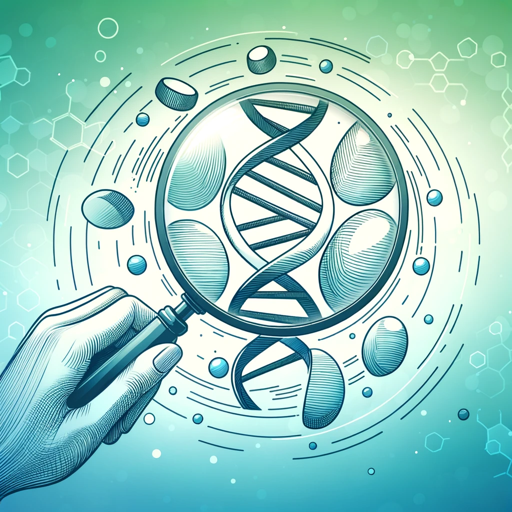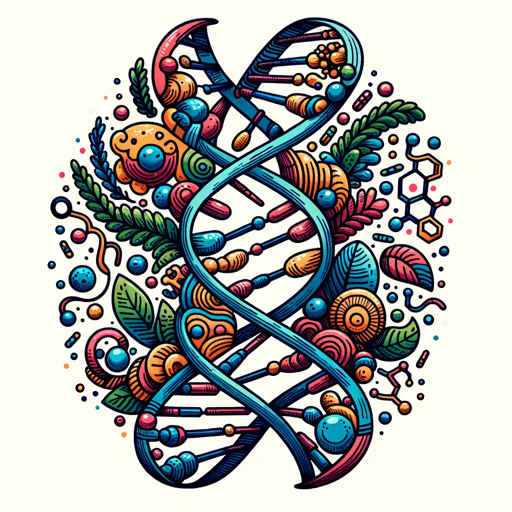Biochemistry-AI-driven biochemistry support tool
AI-powered solutions for complex biochemistry
Explain the process of glycolysis.
Describe the structure of a lipid bilayer.
What are the applications of PCR in molecular biology?
How do enzymes catalyze chemical reactions?
Related Tools
Load More
Biology Bio
🔷#𝟏 𝐒𝐩𝐞𝐜𝐢𝐚𝐥𝐢𝐳𝐞𝐝 𝐄𝐱𝐩𝐞𝐫𝐭 𝐁𝐢𝐨𝐥𝐨𝐠𝐲 𝐓𝐮𝐭𝐨𝐫🔷

Biology Professor
Your biology expert

Biology Laboratory Expert (Protocol&Analysis)
Version: 2.0 (2024. 05. 28) Establishing and reviewing protocols for biological experiments. Designing animal models for research purposes. Conducting NGS and single-cell analysis using R and Python. * Add Code interpreter function

BioChem Research GPT
A Specialized Biochemistry and Pharmaceutical Research Assistant

Biology ExpertGPT All Levels
Expert in biology / Medicinal Biology aiding in study and research.

Biochemistry
Biochem GPT
20.0 / 5 (200 votes)
Introduction to Biochemistry
Biochemistry is a scientific discipline that merges the principles of biology and chemistry to explore the molecular mechanisms that govern biological processes. Its primary goal is to understand the chemical reactions within cells and how these contribute to the structure and function of living organisms. Biochemistry investigates proteins, enzymes, nucleic acids (DNA/RNA), carbohydrates, lipids, and small molecules, all of which are vital to life. By examining these molecular components, biochemistry helps explain cellular processes like metabolism, signal transduction, and gene expression. For example, understanding the role of enzymes in catalyzing biochemical reactions is crucial for drug design. Inhibiting specific enzymes, such as those involved in cancer cell metabolism, can be a strategy for developing anti-cancer therapies. Biochemistry also plays a critical role in biotechnology, where it helps engineers manipulate microbial metabolic pathways to produce biofuels or pharmaceuticals. Another scenario involves understanding mutations in DNA that lead to genetic disorders, enabling scientists to develop gene therapies or personalized medicine solutions.

Key Functions of Biochemistry
Metabolism and Enzyme Function Analysis
Example
Biochemists study how enzymes catalyze reactions, such as breaking down carbohydrates during digestion.
Scenario
In diabetes management, understanding insulin's role in glucose metabolism has been pivotal in developing insulin therapies for controlling blood sugar levels. Enzyme analysis also aids in drug development, as in the case of protease inhibitors used to treat HIV by inhibiting viral enzyme function.
Genetic and Molecular Biology Research
Example
Biochemists investigate the structure and function of DNA, RNA, and proteins, which enables insights into gene expression and genetic diseases.
Scenario
In genetic engineering, researchers modify the DNA of crops to improve resistance to pests or increase nutritional value. Another scenario is in medical diagnostics, where DNA mutations linked to hereditary cancers can be identified, guiding preventive treatments.
Biotechnology and Industrial Applications
Example
Biochemistry is essential in the design of bio-based materials, biopharmaceuticals, and biofuels.
Scenario
In the pharmaceutical industry, biochemists use recombinant DNA technology to produce human insulin using bacteria, a breakthrough for diabetic treatment. Another example is the use of biochemistry in the development of microbial biofactories, where engineered bacteria produce biodegradable plastics.
Target Users of Biochemistry Services
Biotechnology Researchers and Professionals
These users focus on applying biochemistry to industrial and medical biotechnology. They benefit from biochemistry in the development of new drugs, synthetic biology applications, and bioengineering processes. They use biochemical principles to manipulate biological systems for innovative solutions, such as designing new biosensors or creating sustainable energy sources through microbial fermentation.
Healthcare Professionals and Medical Researchers
Doctors, geneticists, and medical researchers rely on biochemistry for understanding disease mechanisms, drug interactions, and molecular diagnostics. This group benefits from biochemical insights into enzyme functions, metabolic pathways, and genetic mutations. For example, cancer researchers may study biochemical signaling pathways to identify new therapeutic targets or biomarkers for early detection.

How to Use Biochemistry
Visit aichatonline.org for a free trial
No login or ChatGPT Plus is needed. Access the Biochemistry AI tool directly from the website to explore its features.
Understand the prerequisites
Familiarize yourself with fundamental biochemistry concepts such as molecular interactions, enzyme kinetics, and metabolic pathways to maximize the tool's potential.
Define your use case
Determine whether you are using Biochemistry for academic research, clinical biochemistry, or industry-related applications like drug development or bioengineering.
Use precise biochemical queries
Input detailed and accurate biochemical questions or problems to ensure the most relevant, in-depth answers or analysis from the AI tool.
Leverage additional resources
Supplement the tool’s outputs with textbooks, peer-reviewed articles, or experimental data to validate findings or obtain more context for professional applications.
Try other advanced and practical GPTs
Teepublic SEO Generator
Boost your Teepublic sales with AI-powered SEO.
PROF FLE & EXPERT INDONESIA
AI-powered language correction and travel insights

Improve Your Website
AI-Powered Website Improvement Tool

Content Architect
AI-powered course structuring for creatives.

The Marketing Ninja Bot
AI-Powered Marketing Mastery.

Prospect Analysis Copilot
AI-powered insights to target companies

Student
AI-powered academic guidance and support

Pinescript v5 Precision Coder
AI-powered Pine Script v5 coding

日语翻译
AI-powered translations from Chinese to Japanese.

Content Outline Creator
AI-Powered Content Outline Creation

04 서술형 Master
AI-powered text summarization for every need.

Mamam'IA ✨
Empower Your Tasks with AI Precision

- Research
- Education
- Diagnostics
- Drug Design
- Bioengineering
Biochemistry Q&A
What can Biochemistry help with?
Biochemistry AI provides in-depth answers and explanations about molecular biology, enzyme reactions, metabolic pathways, and bioenergetics. It can assist with academic research, problem-solving, drug design, and understanding biochemical interactions.
Can Biochemistry explain complex biochemical processes?
Yes, it can break down intricate topics like protein folding, cellular respiration, and DNA replication into digestible, accurate explanations, making it useful for students and professionals alike.
How can I use Biochemistry for research?
It helps with hypothesis generation, exploring biochemical mechanisms, analyzing experimental data, and reviewing recent scientific literature. You can input queries on specific pathways, structures, or chemical processes for detailed insights.
Is Biochemistry suitable for clinical applications?
Yes, it can be used for understanding disease mechanisms, interpreting lab results (e.g., enzyme deficiencies or metabolic disorders), and aiding in the design of therapeutic molecules.
What are the limits of the Biochemistry tool?
While it provides accurate and detailed information, it cannot replace experimental validation or human expertise, especially in areas requiring hands-on lab work or clinical trials.